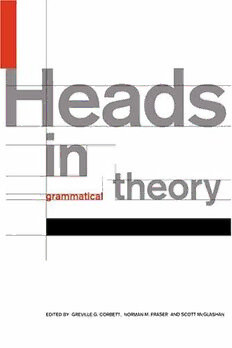
Heads in Grammatical Theory PDF
351 Pages·1993·8.109 MB·English
Most books are stored in the elastic cloud where traffic is expensive. For this reason, we have a limit on daily download.
Preview Heads in Grammatical Theory
Description:
Contemporary linguistic theories distinguish the principal element of a phrase - the 'head' - from the subordinate elements it dominates. This pervasive grammatical concept has been used to describe and account for linguistic phenomena ranging from agreement and government to word order universals, but opinions differ widely on its precise definition. A key question is whether the head is not already identified by some other, more basic notion or interacting set of notions in linguistics. Heads in Grammatical Theory is the first book devoted to the subject. Providing a clear view of current research on heads, some of the foremost linguists in the field tackle the problems set by the assumptions of particular grammatical theories and offer insights which have relevance across theories. Questions considered include whether there is a theory-neutral definition of head, whether heads have cognitive reality, how to identify the head of a phrase, and whether there are any universal correlations between headedness and deletability.
See more
The list of books you might like
Most books are stored in the elastic cloud where traffic is expensive. For this reason, we have a limit on daily download.
